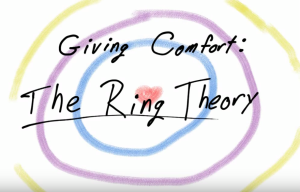by Carolyn Thomas ♥ @HeartSisters
 While clinical psychologist Susan Silk was recuperating from surgery, she decided that she wasn’t feeling up to having any visitors. But when one of her work colleagues who really, really wanted to visit was asked to respect Susan’s request for privacy, her astonishing response to Susan was:
While clinical psychologist Susan Silk was recuperating from surgery, she decided that she wasn’t feeling up to having any visitors. But when one of her work colleagues who really, really wanted to visit was asked to respect Susan’s request for privacy, her astonishing response to Susan was:
“This isn’t just about you!”
Well, actually, it was all about Susan, and only about Susan. Yet sometimes, our friends, family and other visitors seem to forget what to say – and what never to say – to people suffering a trauma, as Susan described in a Los Angeles Times article co-written with Barry Goldman last year.
In fact, her own experience as a patient prompted Susan to come up with a deceptively simple technique to help others avoid doing or saying the wrong thing. She claims that this technique works for all kinds of crises: medical, legal, financial, romantic, even existential. Susan calls it the Ring Theory:
“Draw a circle. This is the center ring. In it, put the name of the person at the center of the current trauma. (If it’s a medical trauma, that’s the patient’s name.) Now draw a larger circle around the first one. In that ring put the name of the person next closest to the trauma (like the patient’s spouse, children or parents).
“Repeat the process as many times as you need to. In each larger ring put the next closest people. Parents and children before more distant relatives. Intimate friends in smaller rings, less intimate friends in larger ones.
“When you are done, you have a Kvetching Order. Tape it to your refrigerator.
“Here are the rules. The person in the center ring can say anything she wants to anyone, anywhere.
“She can kvetch and complain and whine and moan and curse the heavens and say: ‘Life is unfair!’ or ‘Why me?’ That’s the one payoff for being in the center ring.
“Everyone else can say those things too, but only to people in larger rings.
“When you are talking to a person in a ring smaller than yours, someone closer to the center of the crisis, the goal is to help. Listening is often more helpful than talking. But if you’re going to open your mouth, ask yourself if what you are about to say is likely to provide comfort and support. If it isn’t, don’t say it.
“Don’t give advice. People who are suffering from trauma don’t need advice. They need comfort and support. So say, ‘I’m sorry!’ or ‘This must really be hard for you!’ or ‘Can I bring you a pot roast?’ Don’t say: ‘You should hear what happened to me! or ‘Here’s what I would do if I were you.’
“And never say: ‘This is really bringing me down.’
“Complaining to someone in a smaller ring than yours doesn’t do either of you any good. On the other hand, being supportive to her principal caregiver may be the best thing you can do for the patient.
“If you want to scream or cry or complain, if you want to tell someone how shocked you are or how icky you feel, or whine about how it reminds you of all the terrible things that have happened to you lately, that’s fine. It’s a perfectly normal response.
“Just do it to someone in a bigger ring.”
Susan sums up this technique by reminding us that the goal of the Ring Theory is “Comfort IN, dump OUT.” You can say whatever you want if you just wait until you’re talking to someone in a larger ring than yours.
I’d love to add one additional reminder to Susan’s Ring Theory: when you’re talking to the person in the centre of a crisis (the patient, for example) do not under any circumstances start talking about your own or your Aunt Stella’s far more interesting crises. Those coping with a crisis simply cannot begin to focus on you or your fascinating stories. Remember Susan’s advice:
“Ask yourself if what you are about to say is likely to provide comfort and support. If it isn’t, don’t say it.”
And don’t worry, warn Susan and Barry. You’ll get your turn in the center ring. You can count on that.
♥
Watch this simple video (2:36) created by critical care nurse Heather MacNamara. Thanks for sending this to me, Heather!
Susan Silk is a clinical psychologist. Barry Goldman is an arbitrator and mediator and the author of “The Science of Settlement: Ideas for Negotiators.”
See also:
- Empathy 101: how to sound like you give a damn
- “You look great!” – and other things you should never say to heart patients
- “I care about you” and other things to say to sick friends
- ‘Healthy Privilege’ – when you just can’t imagine being sick
- Ten helpful things to say to a sick friend
Q: How did Susan’s Ring Theory advice ring true for you?
.


I couldn’t find a video on this very important theory to share when a friend’s child was ill, so I made one.
LikeLike
Thanks Heather! I love this, and have inserted it into my post. Well done!! ♥
LikeLike
There is only one person I want to come see me when I’m in the hospital, my Husband. He hates the hospital and wants to be gone as soon as possible, the only person I know who won’t hang around trying to “entertain” me or me having to ‘entertain” them.
People who fall apart are also not high on my list of visitors.
As for things to say…
– no chiding the person who didn’t know she was having a heart attack, so she had her husband drive her to the ER…non-productive and in the past.
– Don’t tell a patient they need their hair washed.
– Do offer a warm washcloth, especially if they can’t get out of bed, yet.
– Offer to clean their glasses for them.
– Does the patient need someone to pick up their mail or children, help the spouse with the kids and rides to school?
That is worth more than any bouquet of flowers and long, sad faces.
LikeLike
Thank you Elizabeth! This useful list offers some truly great suggestions. Your “long, sad faces” comment reminds me of when my Dad lay dying in hospital, visited every day by a longtime friend who was so upset by my father’s rapidly declining health that all he could do was stand at the foot of the bed and weep unconsolably. Can you imagine how awful that was for the patient? We had to ask him to stop visiting.
LikeLike
Thanks Carolyn. I’m doing reasonably well now.
At my cardiologist’s suggestion, I had a T-shirt made, with FRAGILE printed on the front & HANDLE WITH CARE printed on the back. I wear it to my appointments with him, much to everyone’s amusement.
The team finally reached the senior cardiac surgeon who had replaced both of my valves & happened to be out of town the weekend I was admitted. He told them not to open up my chest again, so I had the “clot buster” drug, followed by 2+ weeks of high-dose IV Heparin.
My Coumadin protocol is stricter now. Since my first valve was replaced, in 2000, My INR target has been 3.5. Now, if my INR is under 3.0, I have to self-inject Heparin twice a day until my INR level is acceptable.
LikeLike
Love your T-shirt concept! So glad your current protocol is keeping you “doing reasonably” now.
LikeLike
This is so important it should be taught in elementary school!
When I was in the CCU the only visitor I could have (or wanted) was my husband.
I had large clots on both of my artificial valves, the mitral & tricuspid, so I was in immediate danger of a stroke or pulmonary embolism. In fact, it was pretty amazing I had made it to the CCU intact.
My cardiac team was monitoring me closely, scanning the literature to find a precedent for treatment, & keeping me on a high dose of IV Heparin. Two treatment options were being discussed: emergency open-heart surgery to replace both artificial valves (very high-risk), or a “clot-busting” drug that would nibble away at the clots but might free pieces of them, causing the problems we were trying to avoid.
The stroke team talked to me. The head of ICU talked to me. Not only was I was not allowed to get out of bed, any movement I made had to be slow & careful. Hours went by. Members of the team came & went with news of their latest thinking & (always changing) current tentative plan.
Remembering that an old friend of mine had worked for a few years as an RN in CCU, I called her so I could get her thoughts on my situation. I got straight to the point, telling her where I was & what was happening.
Then, as a joke, I added: “How was your week?”.
To my shock, she started to give a play-by-play description of her week! As it was, I was using up everything I had to calmly focus on all the medical information & opinions I was getting. I had no emotional room for her outside-the-hospital life.
I cut her off with, “Oh, I’ve got to go!” & hung up the phone.
LikeLike
Oh Jennifer!!!!! Your story TAKES THE CAKE! And your friend is a NURSE!?! Unbelievable… The only remotely acceptable response to a patient who says (seriously or jokingly) ‘so how was your week?’ is some version of: “NEVER MIND ABOUT ME – let’s focus on how YOU are doing!”
PS Which of the options did you end up choosing? And how ARE you doing now?
LikeLike
This advice is right on the mark and hospitals should have it posted where visitors can read it!
It’s hard to bite your tongue sometimes, as a visitor, but worth it when you understand a patient’s point of view.
LikeLike
You are so right, Gail – it is indeed so hard to bite one’s tongue. And who knows, maybe if Susan Silk’s ‘Ring Theory’ were widely posted in hospitals, more visitors would learn to think twice.
LikeLike
Thank You!
This has been the hardest part of trying to stay well. I have gone so far as not tell anyone when I am hospitalized or have an episode almost to the point of isolation.
The Chaplain came to my room during my last hospital stay and asked me if I had anyone in my life. My answer was I have too many and at times like these I cannot handle their drama.
I am simply not strong enough and need to put all my energy into my own healing.
LikeLike
You bring up such an important point, Brenda: not every patient wants or needs visitors – particularly any involving drama! Sometimes, quiet, healing and rest is what’s needed most. Always ask the patient what will help.
LikeLike